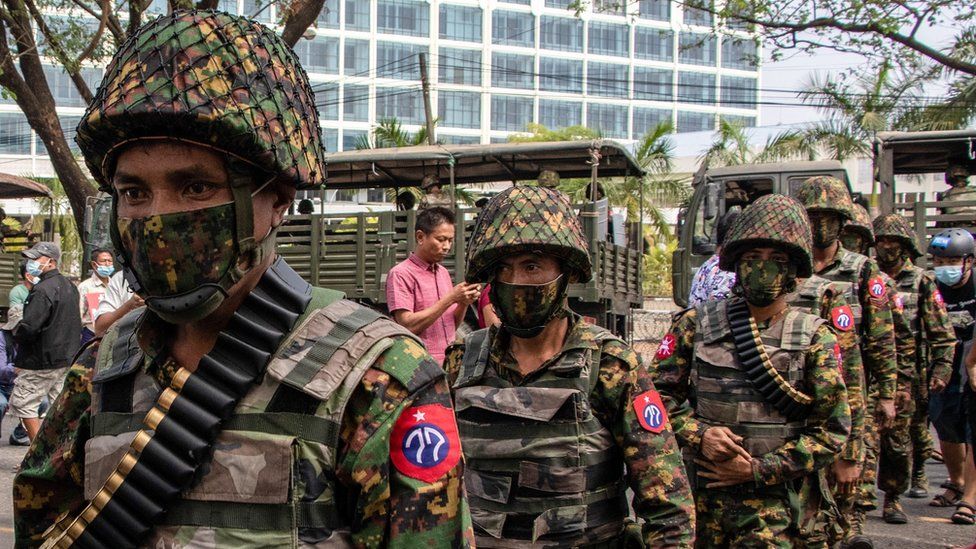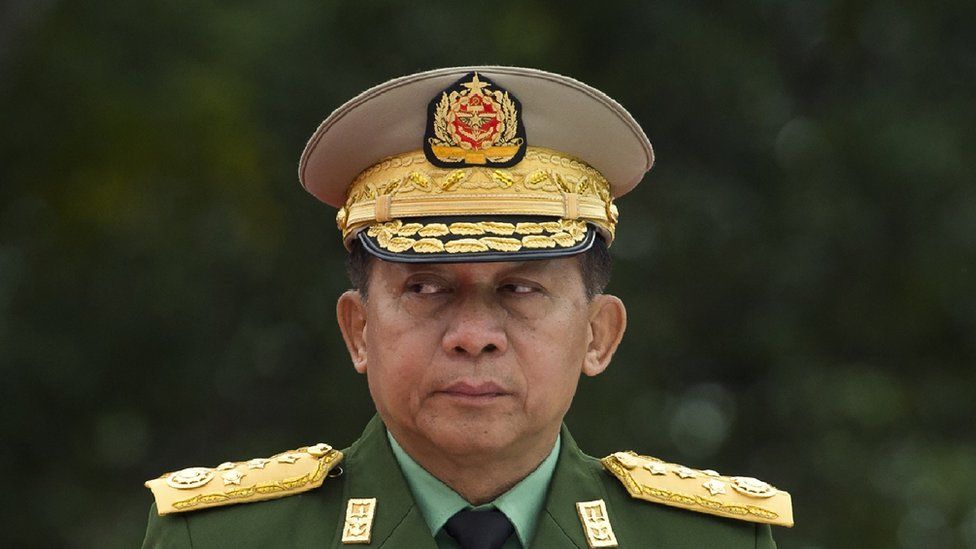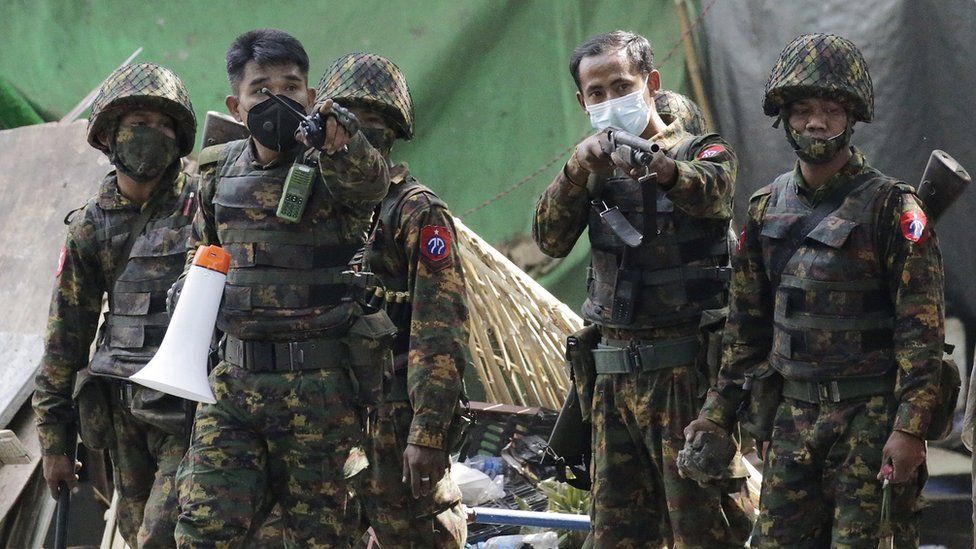Myanmar coup: The shadowy business empire funding the Tatmadaw
By Joshua Cheetham
BBC News

Myanmar's military - the leaders of its recent coup - are funded by a huge chunk of the national budget. But the armed forces also draw a vast and secretive income from sprawling business interests:
At Yangon's popular Indoor Skydiving Centre, visitors can experience the thrill of jumping out of a plane from the safety of a vertical wind tunnel.
But few people spiralling through this high-flying attraction may realise that it is part of a huge, military-run business empire - one completely woven into the fabric of national life.
Critics argue that this lucrative network has made Myanmar's coup possible and put the military's accountability into free fall.
Civilian businesses talk of an environment like "Sicily under the Mafia", while activists say that democratic reforms can only be possible only when "the military [is] back to barracks".
Two conglomerates bankrolling the military
Myanmar's military - the Tatmadaw - began its involvement in business after the socialist coup of Ne Win in 1962.
For years, military battalions were required to be self-sufficient and encouraged to develop stakes in local enterprises to fund their operations.

While this practice has been phased out, two military-run conglomerates were established in the 1990s as the government began privatising state industries.
Both organisations - Myanmar Economic Corporation (MEC) and Myanmar Economic Holdings Limited (MEHL) - have since become a key source of wealth for the Tatmadaw, with stakes in everything from banking and mining to tobacco and tourism. MEHL also operates the military's pension fund.
Several military leaders and their families hold extensive business interests as well, and have been subject to sanctions in the past.
Aung Pyae Sone - the son of coup leader Gen Min Aung Hliang - owns several companies, including a beach resort, and has a majority stake in national telecoms carrier Mytel.
The full extent of these business interests is hard to quantify. But experts say that the military's business clout remains significant, despite recent democratic reforms, and the coup could partly be an attempt to protect these financial interests.
'Insulated from accountability'
The little we do know about the military's financial reach has only come to light in recent years.
A UN report in 2019, spurred by Myanmar's crackdown on Rohingya communities, concluded that business revenues enhanced the military's ability to carry out human rights abuses with impunity.
Through a network of conglomerate-owned businesses and affiliates, the UN said the Tatmadaw had been able to "insulate itself from accountability and oversight".
Details about MEHL's structure and finances were also revealed in two internal reports - one filed by the conglomerate in January 2020, the other leaked by activist groups Justice for Burma and Amnesty International.

They showed that the conglomerate is run by the military's top brass, including several leaders of the ongoing coup. Around a third of all shareholders are military units, while the rest are owned by former and current Tatmadaw personnel.
The leaked report said that, between 1990 and 2011, MEHL paid its shareholders 108bn kyats in dividends - worth $16.6bn, according to official exchange rates at the time.
It also suggested that the military uses MEHL shares to reward loyalty and punish bad behaviour. One table lists 35 people who were stripped of their dividends for reasons like desertion and imprisonment.
The MEHL has not commented publicly on the leaked report.
Renewed calls for sanctions
In the wake of the coup, advocacy groups have issued further calls for targeted sanctions against the military and its access to the global financial system.
Many activists want to see the conglomerates dismantled as well.
In a statement to the BBC, Justice for Myanmar accused the military of being in "an unlawful conflict of interest".
"The wealth stolen by the military and their businesses belongs to the people of Myanmar and must be returned to them," they added.
The US has added both conglomerates to a trade blacklist, and rolled out fresh sanctions against military and government figures, along with three mining companies. Canada, New Zealand and the UK have also introduced their own targeted measures, though none of them has focused on the conglomerates directly.
Campaigners argue that historically weak sanctions have emboldened the Tatmadaw to carry out the coup and to continue alleged human rights abuses.
But experts have told the BBC there is a strong appetite to ramp up sanctions - at the right time.
"The world is still waiting to see how this plays out," says George McLeod, managing director of Access Asia, a risk management firm specialising in the region. "From what I've heard from people on the inside, Norway is trying to form some kind of groundwork to bring about a negotiated solution."
In the meantime, there is increasing resentment among some local business figures about the conglomerates' power.
"They almost describe it in the same way that a business owner operating in Sicily would talk about the Mafia," Mr McLeod told the BBC. "You have to deal with them if you cross their radar. But you don't want to."
'They want to be an international player'
The Tatmadaw are already starting to feel the pressure from foreign investors.
Japanese beverage firm Kirin has ended two lucrative deals with MEHL that have helped it to dominate Myanmar's beer market. Singaporean businessman Lim Kaling has also cut his investment in a tobacco firm linked to the conglomerate.
Local protesters, meanwhile, have been boycotting companies with ties to the new government - including jewellery shops and cigarette brands.
Calls for international sanctions aren't universal, however. China and Russia have rebuffed efforts by other members of the UN Security Council to condemn the Tatmadaw.

Experts agree that while sanctions are an important piece of the puzzle, they must work in tandem with legal and diplomatic pressure, and arms embargoes.
The Tatmadaw's deputy chief, Soe Win, has told the UN that they are ready to face international pressure if necessary.
Without multilateral action, Myanmar could become a pariah state once more, says Peter Kucik, a former sanctions advisor at the US Treasury.
"This group of generals in power right now is more or less the same group that was in power under the SPDC regime (a military junta which ruled Myanmar from 1997-2011), and they've shown that they're perfectly comfortable living in an isolated country," he told the BBC.
But while the country could lean back on trade from partners like China, local business figures are wary of this prospect, adds Mr Kucik.
"They want to deal with top-tier Japanese companies, they want to deal with Western companies, and they want to be a player on the international stage in the same way as Thailand," says Mr Kucik.
Whatever happens next, advocacy groups say that pulling on the military's purse strings, and reforming their conglomerates, will be essential to democratic reform.
"That's what the people of Burma want," says Anna Roberts, director of Burma Campaign UK. "They want the military back to barracks, and they want a civilian economy and a civilian federal government that respects their wishes."
No comments:
Post a Comment